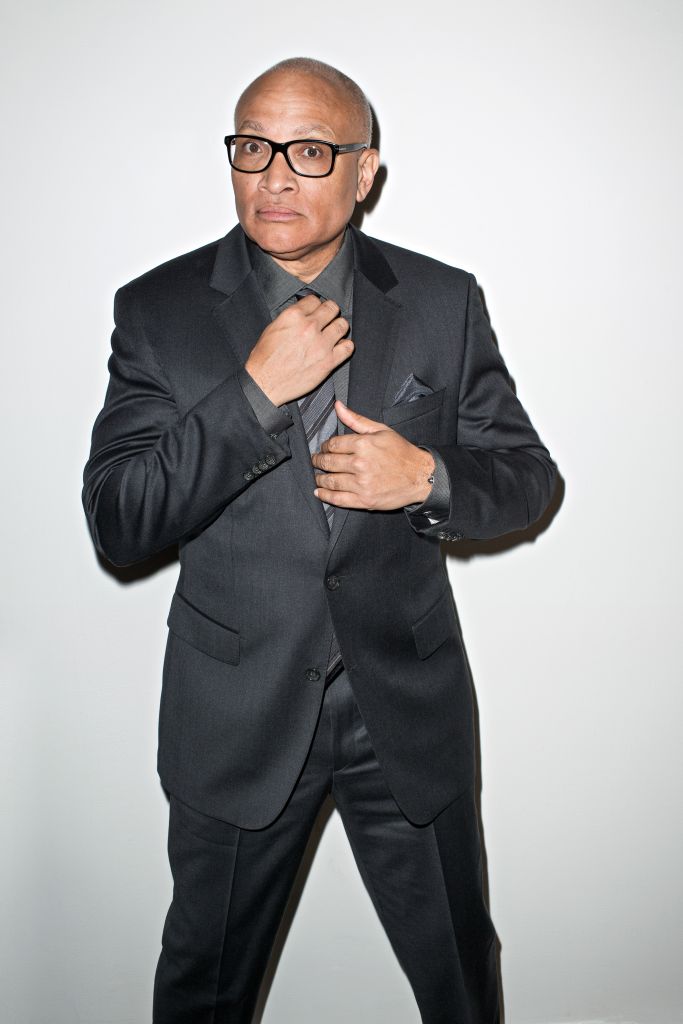On Monday, Comedy Central debuted The Nightly Show With Larry Wilmore. We’re only a few episodes in, but it’s looking like the eponymous ex-Daily Show correspondent was the right call to be the successor to the Comedy Central darling Stephen Colbert. The Nightly Show, though, is more in line with network-mate Jon Stewart. Wilmore evades Colbert’s faux-Republican schtick for a more natural tone—one that lets the absurdity of the modern day speak for itself.
So far, Wilmore has already mocked the Academy Awards, poked fun at Al Sharpton, and taken down Bill Cosby (“That motherfucker did it”).
“There’s the ‘Top Dog/Underdog’ rule. Underdog gets to make fun of Top Dog, but Top Dog can’t make fun of Underdog. And people get mad at it, but sorry … that’s just how it is.”
The response has been favorable. Critics have praised Wilmore’s affability and wryness, even his “ideological unpredictability.” He has, as the New York Times’ Alessandra Stanley puts it, “a disarming way of laughing at his own jokes and those of others.”
The show’s closing Bill Maher-style roundtable discussion format, while less of an immediate hit, certainly offers long-term potential. But beyond structure, it would be impossible—even irresponsible—to ignore Wilmore’s place as a much-needed black host of a satirical nightly news program.

The effectiveness of satirical news is well documented. A 2007 analysis in the Atlantic Journal of Communication looked at 222 individual news stories from The Daily Show, spanning 52 episodes, to see just how often Jon Stewart’s subject of ire is political in nature. Researchers found that almost half of Stewart’s segments tackled world affairs, with a good portion of his show also dedicated to the news media itself. While the results aren’t all that surprising, the study gives empirical evidence that The Daily Show—and, by extension, other satirical news programs—has a real hand in shaping an audience’s political viewpoint.
This past November, Paul Brewer, a communications professor at the University of Delaware—and, as it happens, one of the researchers on that 2007 Daily Show analysis—investigated how knowledgeable viewers of The Daily Show, Colbert Report, and HBO’s Last Week Tonight With John Oliver were about the ongoing net neutrality debate, compared to viewers of the traditional news programs. Surveying 900 adults, Brewer found that 29 percent of Last Week Tonight viewers had “heard a lot” about net neutrality, compared to 23 percent for Colbert Report and 22 percent of Daily Show viewers. Those who watched the big news networks, on the other hand, fared far worse; 11 percent of both MSNBC and CNN viewers reported seeing heavy coverage on the net neutrality debate. Worse yet, that number dropped to just seven percent for Fox News viewers.

To be fair, the major news networks didn’t cover the net neutrality debate very extensively, so it’s not that those viewers were misinformed—simply uninformed. But still, the study highlights again the significance that these programs can have in influencing viewers, and in turn, shaping public discourse.
This net neutrality study isn’t just some sort of single subject phenomenon. A study released last year similarly showed that Colbert Report did a better job of explaining campaign financing and the role of money in politics than other news networks. In fact, a 2007 Pew report shows that Daily Show and Colbert Report viewers are actually better-informed that their peers who watch traditional news outlets.
The basic takeaway is this: Maybe what these satirists are doing isn’t journalism—and indeed they insist that it isn’t—but that doesn’t mean it isn’t informative, or impactful.

A few days ago, talking with NPR, Wilmore mentioned his own “Top Dog” theory, which says that, as a black comedian, he can joke about race in a manner that his white co-satirists cannot. His idea didn’t just hold to race; any group of people, he explained, who have traditionally been underserved have that comedic right. “There’s the ‘Top Dog/Underdog’ rule,” Wilmore told NPR. “Underdog gets to make fun of Top Dog, but Top Dog can’t make fun of Underdog. And people get mad at it, but sorry … that’s just how it is.”
To be sure, a 2014 study out of the University of California-Los Angeles’ Ralph J. Bunche Center for African American Studies confirmed that, yes, the media has a diversity problem. Minorities are underrepresented on broadcast comedies and dramas by a seven-to-one ratio, while claiming just five percent of those lead roles during the 2011-12 television season, according to the research.
“One of the findings that jumps out clearly from our 2014 Hollywood Diversity Report is that the industry is a very insular one, which in every arena is dominated by white males,” says Darnell Hunt, a sociology professor and director of the Bunche Center. “While there are obviously more women and people of color working behind the camera and in front of it now than in 1950, we’re treading water at best in terms of diverse representation.”
Wilmore’s show won’t center on race; he’s already riffed on greenhouse gas emissions and President Obama’s State of the Union address. Still, as a black man in a very white satirical late night landscape, this idea of the “Top Dog/Underdog” is important, and should factor into Wilmore’s coverage of current events. And it has: When discussing said greenhouse gas emissions, Wilmore joked that “it won’t just be black people saying ‘I can’t breathe.’”
“One of the things we know from research is that the meaning of a message has a lot to do with who delivers it,” Hunt says. “As an African American who has been subjected to the dynamics of race in America, Wilmore may be able to use humor and satire to make political observations that might be perceived as insensitive or worse if uttered by the typical late night host.”
The public needs satirical news because, like all good comedy, it challenges the way we think about our everyday lives. Now we have Larry Wilmore, to give us one more much-needed, and long overdue, perspective.




